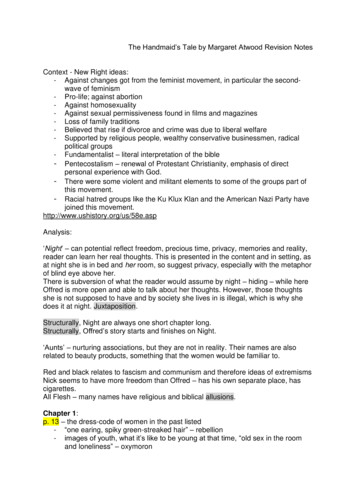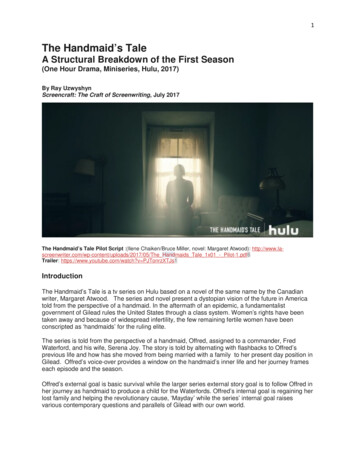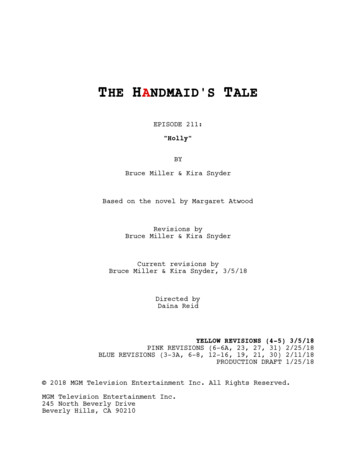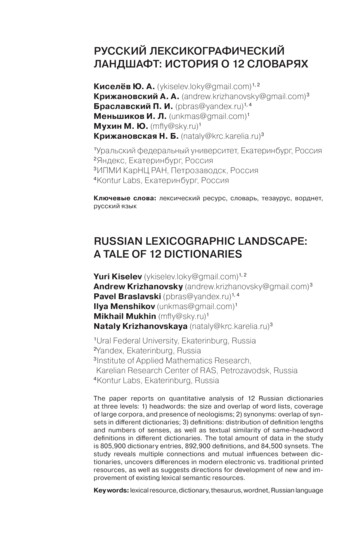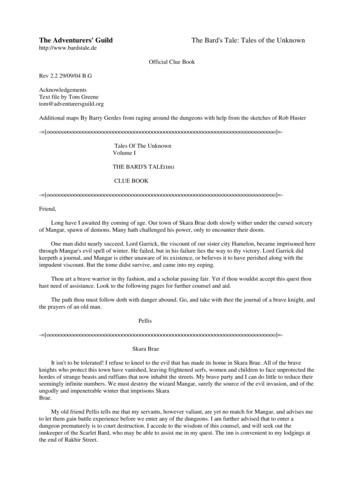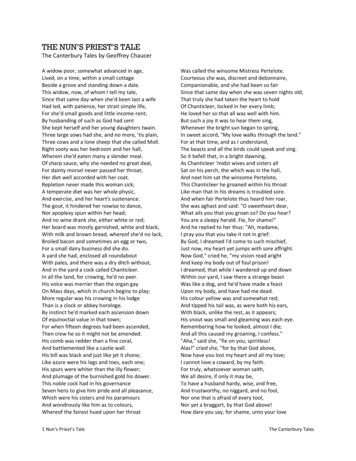
Transcription
SIDDHARTHAAn Indian TaleHermann HesseTHE INTERNET ARCHIVEThe PresidioSan Francisco
ContentsFIRST PART3THE SON OF THE BRAHMAN5WITH THE SAMANAS15GOTAMA27AWAKENING39SECOND PART45KAMALA47WITH THE CHILDLIKE PEOPLE65SANSARA77BY THE RIVER89THE FERRYMAN103THE SON119OM131GOVINDA1411
2This etext was produced by Michael Pullen globaltraveler5565@yahoo.com, with original translationsmade by: Gunther Olesch, Anke Dreher, Amy Coulter, Stefan Langer, Semyon Chaichenets. Proofreading corrections were done by Chandra Yencocyenco@dnet.net.id and Isaac Jones ijones@cis.ohiostate.edu.
3
4
FIRST PARTTo Romain Rolland, my dear friend5
6SIDDHARTHA
THE SON OF THE BRAHMANIN THE SHADE of the house, in the sunshine of theriverbank near the boats, in the shade of the Salwood forest, in the shade of the fig tree is where Siddhartha grew up, the handsome son of the Brahman, theyoung falcon, together with his friend Govinda, son ofa Brahman. The sun tanned his light shoulders by thebanks of the river when bathing, performing the sacredablutions, the sacred offerings. In the mango grove,shade poured into his black eyes, when playing as a boy,when his mother sang, when the sacred offerings weremade, when his father, the scholar, taught him, when thewise men talked. For a long time, Siddhartha had beenpartaking in the discussions of the wise men, practising debate with Govinda, practising with Govinda theart of reflection, the service of meditation. He alreadyknew how to speak the Om silently, the word of words,to speak it silently into himself while inhaling, to speakit silently out of himself while exhaling, with all theconcentration of his soul, the forehead surrounded bythe glow of the clear-thinking spirit. He already knewto feel Atman in the depths of his being, indestructible,one with the universe.Joy leapt in his father’s heart for his son who wasquick to learn, thirsty for knowledge; he saw him growing up to become great wise man and priest, a princeamong the Brahmans.7
8SIDDHARTHABliss leapt in his mother’s breast when she saw him,when she saw him walking, when she saw him sit downand get up, Siddhartha, strong, handsome, he who waswalking on slender legs, greeting her with perfect respect.Love touched the hearts of the Brahmans’ youngdaughters when Siddhartha walked through the lanes ofthe town with the luminous forehead, with the eye of aking, with his slim hips.But more than all the others he was loved by Govinda,his friend, the son of a Brahman. He loved Siddhartha’seye and sweet voice, he loved his walk and the perfectdecency of his movements, he loved everything Siddhartha did and said and what he loved most was hisspirit, his transcendent, fiery thoughts, his ardent will,his high calling. Govinda knew: he would not becomea common Brahman, not a lazy official in charge of offerings; not a greedy merchant with magic spells; not avain, vacuous speaker; not a mean, deceitful priest; andalso not a decent, stupid sheep in the herd of the many.No, and he, Govinda, as well did not want to becomeone of those, not one of those tens of thousands of Brahmans. He wanted to follow Siddhartha, the beloved, thesplendid. And in days to come, when Siddhartha wouldbecome a god, when he would join the glorious, thenGovinda wanted to follow him as his friend, his companion, his servant, his spear-carrier, his shadow.Siddhartha was thus loved by everyone. He was asource of joy for everybody, he was a delight for themall.But he, Siddhartha, was not a source of joy for himself, he found no delight in himself. Walking the rosy
THE SON OF THE BRAHMAN9paths of the fig tree garden, sitting in the bluish shadeof the grove of contemplation, washing his limbs dailyin the bath of repentance, sacrificing in the dim shadeof the mango forest, his gestures of perfect decency,everyone’s love and joy, he still lacked all joy in hisheart. Dreams and restless thoughts came into his mind,flowing from the water of the river, sparkling from thestars of the night, melting from the beams of the sun,dreams came to him and a restlessness of the soul, fuming from the sacrifices, breathing forth from the versesof the Rig-Veda, being infused into him, drop by drop,from the teachings of the old Brahmans.Siddhartha had started to nurse discontent in himself,he had started to feel that the love of his father andthe love of his mother, and also the love of his friend,Govinda, would not bring him joy for ever and ever,would not nurse him, feed him, satisfy him. He hadstarted to suspect that his venerable father and his otherteachers, that the wise Brahmans had already revealedto him the most and best of their wisdom, that they hadalready filled his expecting vessel with their richness,and the vessel was not full, the spirit was not content,the soul was not calm, the heart was not satisfied. Theablutions were good, but they were water, they did notwash off the sin, they did not heal the spirit’s thirst, theydid not relieve the fear in his heart. The sacrifices andthe invocation of the gods were excellent—but was thatall? Did the sacrifices give a happy fortune? And whatabout the gods? Was it really Prajapati who had createdthe world? Was it not the Atman, He, the only one, thesingular one? Were the gods not creations, created likeme and you, subject to time, mortal? Was it therefore
10SIDDHARTHAgood, was it right, was it meaningful and the highestoccupation to make offerings to the gods? For whomelse were offerings to be made, who else was to be worshipped but Him, the only one, the Atman? And wherewas Atman to be found, where did He reside, where didhis eternal heart beat, where else but in one’s own self,in its innermost part, in its indestructible part, which everyone had in himself? But where, where was this self,this innermost part, this ultimate part? It was not fleshand bone, it was neither thought nor consciousness, thusthe wisest ones taught. So, where, where was it? Toreach this place, the self, myself, the Atman, there wasanother way, which was worthwhile looking for? Alas,and nobody showed this way, nobody knew it, not thefather, and not the teachers and wise men, not the holysacrificial songs! They knew everything, the Brahmansand their holy books, they knew everything, they hadtaken care of everything and of more than everything,the creation of the world, the origin of speech, of food,of inhaling, of exhaling, the arrangement of the senses,the acts of the gods, they knew infinitely much—butwas it valuable to know all of this, not knowing thatone and only thing, the most important thing, the solelyimportant thing?Surely, many verses of the holy books, particularlyin the Upanishades of Samaveda, spoke of this innermost and ultimate thing, wonderful verses. “Your soulis the whole world”, was written there, and it was written that man in his sleep, in his deep sleep, would meetwith his innermost part and would reside in the Atman.Marvellous wisdom was in these verses, all knowledgeof the wisest ones had been collected here in magic
THE SON OF THE BRAHMAN11words, pure as honey collected by bees. No, not tobe looked down upon was the tremendous amount ofenlightenment which lay here collected and preservedby innumerable generations of wise Brahmans.—Butwhere were the Brahmans, where the priests, where thewise men or penitents, who had succeeded in not justknowing this deepest of all knowledge but also to liveit? Where was the knowledgeable one who wove hisspell to bring his familiarity with the Atman out of thesleep into the state of being awake, into the life, intoevery step of the way, into word and deed? Siddharthaknew many venerable Brahmans, chiefly his father, thepure one, the scholar, the most venerable one. His father was to be admired, quiet and noble were his manners, pure his life, wise his words, delicate and noblethoughts lived behind its brow—but even he, who knewso much, did he live in blissfulness, did he have peace,was he not also just a searching man, a thirsty man?Did he not, again and again, have to drink from holysources, as a thirsty man, from the offerings, from thebooks, from the disputes of the Brahmans? Why did he,the irreproachable one, have to wash off sins every day,strive for a cleansing every day, over and over everyday? Was not Atman in him, did not the pristine sourcespring from his heart? It had to be found, the pristinesource in one’s own self, it had to be possessed! Everything else was searching, was a detour, was gettinglost.Thus were Siddhartha’s thoughts, this was his thirst,this was his suffering.Often he spoke to himself from a ChandogyaUpanishad the words: “Truly, the name of the Brah-
12SIDDHARTHAman is satyam—verily, he who knows such a thing, willenter the heavenly world every day.” Often, it seemednear, the heavenly world, but never he had reached itcompletely, never he had quenched the ultimate thirst.And among all the wise and wisest men, he knew andwhose instructions he had received, among all of themthere was no one, who had reached it completely, theheavenly world, who had quenched it completely, theeternal thirst.“Govinda,” Siddhartha spoke to his friend, “Govinda,my dear, come with me under the Banyan tree, let’spractise meditation.”They went to the Banyan tree, they sat down, Siddhartha right here, Govinda twenty paces away. Whileputting himself down, ready to speak the Om, Siddhartha repeated murmuring the verse:Om is the bow, the arrow is soul,The Brahman is the arrow’s target,That one should incessantly hit.After the usual time of the exercise in meditation hadpassed, Govinda rose. The evening had come, it wastime to perform the evening’s ablution. He called Siddhartha’s name. Siddhartha did not answer. Siddharthasat there lost in thought, his eyes were rigidly focusedtowards a very distant target, the tip of his tongue wasprotruding a little between the teeth, he seemed not tobreathe. Thus sat he, wrapped up in contemplation,thinking Om, his soul sent after the Brahman as an arrow.Once, Samanas had travelled through Siddhartha’stown, ascetics on a pilgrimage, three skinny, witheredmen, neither old nor young, with dusty and bloody
THE SON OF THE BRAHMAN13shoulders, almost naked, scorched by the sun, surrounded by loneliness, strangers and enemies to theworld, strangers and lank jackals in the realm of humans. Behind them blew a hot scent of quiet passion,of destructive service, of merciless self-denial.In the evening, after the hour of contemplation, Siddhartha spoke to Govinda: “Early tomorrow morning,my friend, Siddhartha will go to the Samanas. He willbecome a Samana.”Govinda turned pale, when he heard these words andread the decision in the motionless face of his friend,unstoppable like the arrow shot from the bow. Soonand with the first glance, Govinda realized: Now it isbeginning, now Siddhartha is taking his own way, nowhis fate is beginning to sprout, and with his, my own.And he turned pale like a dry banana-skin.“O Siddhartha,” he exclaimed, “will your father permityou to do that?”Siddhartha looked over as if he was just waking up.Arrow-fast he read in Govinda s soul, read the fear, readthe submission.“O Govinda,” he spoke quietly, “let’s not waste words.Tomorrow, at daybreak I will begin the life of theSamanas. Speak no more of it.”Siddhartha entered the chamber, where his father wassitting on a mat of bast, and stepped behind his fatherand remained standing there, until his father felt thatsomeone was standing behind him. Quoth the Brahman: “Is that you, Siddhartha? Then say what you cameto say.”Quoth Siddhartha: “With your permission, my father.I came to tell you that it is my longing to leave your
14SIDDHARTHAhouse tomorrow and go to the ascetics. My desire is tobecome a Samana. May my father not oppose this.”The Brahman fell silent, and remained silent for solong that the stars in the small window wandered andchanged their relative positions, ’ere the silence wasbroken. Silent and motionless stood the son with hisarms folded, silent and motionless sat the father on themat, and the stars traced their paths in the sky. Thenspoke the father: “Not proper it is for a Brahman tospeak harsh and angry words. But indignation is in myheart. I wish not to hear this request for a second timefrom your mouth.”Slowly, the Brahman rose; Siddhartha stood silently,his arms folded.“What are you waiting for?” asked the father.Quoth Siddhartha: “You know what.”Indignant, the father left the chamber; indignant, hewent to his bed and lay down.After an hour, since no sleep had come over his eyes,the Brahman stood up, paced to and fro, and left thehouse. Through the small window of the chamber helooked back inside, and there he saw Siddhartha standing, his arms folded, not moving from his spot. Paleshimmered his bright robe. With anxiety in his heart,the father returned to his bed.After another hour, since no sleep had come over hiseyes, the Brahman stood up again, paced to and fro,walked out of the house and saw that the moon hadrisen. Through the window of the chamber he lookedback inside; there stood Siddhartha, not moving fromhis spot, his arms folded, moonlight reflecting from hisbare shins. With worry in his heart, the father went back
THE SON OF THE BRAHMAN15to bed.And he came back after an hour, he came back after two hours, looked through the small window, sawSiddhartha standing, in the moon light, by the light ofthe stars, in the darkness. And he came back hour after hour, silently, he looked into the chamber, saw himstanding in the same place, filled his heart with anger,filled his heart with unrest, filled his heart with anguish,filled it with sadness.And in the night’s last hour, before the day began, hereturned, stepped into the room, saw the young manstanding there, who seemed tall and like a stranger tohim.“Siddhartha,” he spoke, “what are you waiting for?”“You know what.”“Will you always stand that way and wait, until it’llbecomes morning, noon, and evening?”“I will stand and wait.“You will become tired, Siddhartha.”“I will become tired.”“You will fall asleep, Siddhartha.”“I will not fall asleep.”“You will die, Siddhartha.”“I will die.”“And would you rather die, than obey your father?”“Siddhartha has always obeyed his father.”“So will you abandon your plan?”“Siddhartha will do what his father will tell him to do.”The first light of day shone into the room. The Brahman saw that Siddhartha was trembling softly in hisknees. In Siddhartha’s face he saw no trembling, hiseyes were fixed on a distant spot. Then his father real-
16SIDDHARTHAized that even now Siddhartha no longer dwelt with himin his home, that he had already left him.The Father touched Siddhartha’s shoulder.“You will,” he spoke, “go into the forest and be aSamana. When you’ll have found blissfulness in theforest, then come back and teach me to be blissful. Ifyou’ll find disappointment, then return and let us onceagain make offerings to the gods together. Go now andkiss your mother, tell her where you are going to. Butfor me it is time to go to the river and to perform thefirst ablution.”He took his hand from the shoulder of his son andwent outside. Siddhartha wavered to the side, as he triedto walk. He put his limbs back under control, bowed tohis father, and went to his mother to do as his father hadsaid.As he slowly left on stiff legs in the first light of daythe still quiet town, a shadow rose near the last hut, whohad crouched there, and joined the pilgrim—Govinda.“You have come,” said Siddhartha and smiled.“I have come,” said Govinda.
WITH THE SAMANASIn the evening of this day they caught up with the ascetics, the skinny Samanas, and offered them their companionship and—obedience. They were accepted.Siddhartha gave his garments to a poor Brahman inthe street. He wore nothing more than the loincloth andthe earth-coloured, unsown cloak. He ate only once aday, and never something cooked. He fasted for fifteendays. He fasted for twenty-eight days. The flesh wanedfrom his thighs and cheeks. Feverish dreams flickeredfrom his enlarged eyes, long nails grew slowly on hisparched fingers and a dry, shaggy beard grew on hischin. His glance turned to icy when he encounteredwomen; his mouth twitched with contempt, when hewalked through a city of nicely dressed people. He sawmerchants trading, princes hunting, mourners wailingfor their dead, whores offering themselves, physicianstrying to help the sick, priests determining the mostsuitable day for seeding, lovers loving, mothers nursing their children—and all of this was not worthy ofone look from his eye, it all lied, it all stank, it all stankof lies, it all pretended to be meaningful and joyful andbeautiful, and it all was just concealed putrefaction. Theworld tasted bitter. Life was torture.A goal stood before Siddhartha, a single goal: to become empty, empty of thirst, empty of wishing, emptyof dreams, empty of joy and sorrow. Dead to him17
18SIDDHARTHAself, not to be a self any more, to find tranquility withan emptied heard, to be open to miracles in unselfishthoughts, that was his goal. Once all of my self wasovercome and had died, once every desire and everyurge was silent in the heart, then the ultimate part of mehad to awake, the innermost of my being, which is nolonger my self, the great secret.Silently, Siddhartha exposed himself to burning raysof the sun directly above, glowing with pain, glowing with thirst, and stood there, until he neither feltany pain nor thirst any more. Silently, he stood therein the rainy season, from his hair the water was dripping over freezing shoulders, over freezing hips andlegs, and the penitent stood there, until he could notfeel the cold in his shoulders and legs any more, until they were silent, until they were quiet. Silently, hecowered in the thorny bushes, blood dripped from theburning skin, from festering wounds dripped pus, andSiddhartha stayed rigidly, stayed motionless, until noblood flowed any more, until nothing stung any more,until nothing burned any more.Siddhartha sat upright and learned to breathe sparingly, learned to get along with only few breathes,learned to stop breathing. He learned, beginning withthe breath, to calm the beat of his heart, leaned to reduce the beats of his heart, until they were only a fewand almost none.Instructed by the oldest if the Samanas, Siddharthapractised self-denial, practised meditation, according toa new Samana rules. A heron flew over the bambooforest—and Siddhartha accepted the heron into his soul,flew over forest and mountains, was a heron, ate fish,
WITH THE SAMANAS19felt the pangs of a heron’s hunger, spoke the heron’scroak, died a heron’s death. A dead jackal was lyingon the sandy bank, and Siddhartha’s soul slipped insidethe body, was the dead jackal, lay on the banks, gotbloated, stank, decayed, was dismembered by hyaenas,was skinned by vultures, turned into a skeleton, turnedto dust, was blown across the fields. And Siddhartha’ssoul returned, had died, had decayed, was scattered asdust, had tasted the gloomy intoxication of the cycle,awaited in new thirst like a hunter in the gap, wherehe could escape from the cycle, where the end of thecauses, where an eternity without suffering began. Hekilled his senses, he killed his memory, he slipped outof his self into thousands of other forms, was an animal, was carrion, was stone, was wood, was water, andawoke every time to find his old self again, sun shoneor moon, was his self again, turned round in the cycle,felt thirst, overcame the thirst, felt new thirst.Siddhartha learned a lot when he was with theSamanas, many ways leading away from the self helearned to go. He went the way of self-denial by meansof pain, through voluntarily suffering and overcomingpain, hunger, thirst, tiredness. He went the way of selfdenial by means of meditation, through imagining themind to be void of all conceptions. These and otherways he learned to go, a thousand times he left hisself, for hours and days he remained in the non-self.But though the ways led away from the self, their endnevertheless always led back to the self. Though Siddhartha fled from the self a thousand times, stayed innothingness, stayed in the animal, in the stone, the return was inevitable, inescapable was the hour, when he
20SIDDHARTHAfound himself back in the sunshine or in the moonlight,in the shade or in the rain, and was once again his selfand Siddhartha, and again felt the agony of the cyclewhich had been forced upon him.By his side lived Govinda, his shadow, walked thesame paths, undertook the same efforts. They rarelyspoke to one another, than the service and the exercisesrequired. Occasionally the two of them went throughthe villages, to beg for food for themselves and theirteachers.“How do you think, Govinda,” Siddhartha spoke oneday while begging this way, “how do you think did weprogress? Did we reach any goals?”Govinda answered: “We have learned, and we’ll continue learning. You’ll be a great Samana, Siddhartha.Quickly, you’ve learned every exercise, often the oldSamanas have admired you. One day, you’ll be a holyman, oh Siddhartha.”Quoth Siddhartha: “I can’t help but feel that it is notlike this, my friend. What I’ve learned, being among theSamanas, up to this day, this, oh Govinda, I could havelearned more quickly and by simpler means. In everytavern of that part of a town where the whorehousesare, my friend, among carters and gamblers I could havelearned it.”Quoth Govinda: “Siddhartha is putting me on. Howcould you have learned meditation, holding your breath,insensitivity against hunger and pain there among thesewretched people?”And Siddhartha said quietly, as if he was talking tohimself: “What is meditation? What is leaving one’sbody? What is fasting? What is holding one’s breath?
WITH THE SAMANAS21It is fleeing from the self, it is a short escape of theagony of being a self, it is a short numbing of the sensesagainst the pain and the pointlessness of life. The sameescape, the same short numbing is what the driver of anox-cart finds in the inn, drinking a few bowls of ricewine or fermented coconut-milk. Then he won’t feelhis self any more, then he won’t feel the pains of lifeany more, then he finds a short numbing of the senses.When he falls asleep over his bowl of rice-wine, he’llfind the same what Siddhartha and Govinda find whenthey escape their bodies through long exercises, stayingin the non-self. This is how it is, oh Govinda.”Quoth Govinda: “You say so, oh friend, and yet youknow that Siddhartha is no driver of an ox-cart and aSamana is no drunkard. It’s true that a drinker numbshis senses, it’s true that he briefly escapes and rests,but he’ll return from the delusion, finds everything tobe unchanged, has not become wiser, has gathered noenlightenment,—has not risen several steps.”And Siddhartha spoke with a smile: “I do not know,I’ve never been a drunkard. But that I, Siddhartha, findonly a short numbing of the senses in my exercises andmeditations and that I am just as far removed from wisdom, from salvation, as a child in the mother’s womb,this I know, oh Govinda, this I know.”And once again, another time, when Siddhartha leftthe forest together with Govinda, to beg for some foodin the village for their brothers and teachers, Siddharthabegan to speak and said: “What now, oh Govinda,might we be on the right path? Might we get closerto enlightenment? Might we get closer to salvation? Ordo we perhaps live in a circle—we, who have thought
22SIDDHARTHAwe were escaping the cycle?”Quoth Govinda: “We have learned a lot, Siddhartha,there is still much to learn. We are not going around incircles, we are moving up, the circle is a spiral, we havealready ascended many a level.”Siddhartha answered: “How old, would you think, isour oldest Samana, our venerable teacher?”Quoth Govinda: “Our oldest one might be about sixtyyears of age.”And Siddhartha: “He has lived for sixty years and hasnot reached the nirvana. He’ll turn seventy and eighty,and you and me, we will grow just as old and will doour exercises, and will fast, and will meditate. But wewill not reach the nirvana, he won’t and we won’t. OhGovinda, I believe out of all the Samanas out there, perhaps not a single one, not a single one, will reach thenirvana. We find comfort, we find numbness, we learnfeats, to deceive others. But the most important thing,the path of paths, we will not find.”“If you only,” spoke Govinda, “wouldn’t speak suchterrible words, Siddhartha! How could it be that amongso many learned men, among so many Brahmans,among so many austere and venerable Samanas, amongso many who are searching, so many who are eagerlytrying, so many holy men, no one will find the path ofpaths?”But Siddhartha said in a voice which contained justas much sadness as mockery, with a quiet, a slightlysad, a slightly mocking voice: “Soon, Govinda, yourfriend will leave the path of the Samanas, he has walkedalong your side for so long. I’m suffering of thirst, ohGovinda, and on this long path of a Samana, my thirst
WITH THE SAMANAS23has remained as strong as ever. I always thirsted forknowledge, I have always been full of questions. I haveasked the Brahmans, year after year, and I have askedthe holy Vedas, year after year, and I have asked the devote Samanas, year after year. Perhaps, oh Govinda, ithad been just as well, had been just as smart and just asprofitable, if I had asked the hornbill-bird or the chimpanzee. It took me a long time and am not finishedlearning this yet, oh Govinda: that there is nothing tobe learned! There is indeed no such thing, so I believe,as what we refer to as ‘learning’. There is, oh my friend,just one knowledge, this is everywhere, this is Atman,this is within me and within you and within every creature. And so I’m starting to believe that this knowledgehas no worser enemy than the desire to know it, thanlearning.”At this, Govinda stopped on the path, rose his hands,and spoke: “If you, Siddhartha, only would not botheryour friend with this kind of talk! Truly, you words stirup fear in my heart. And just consider: what wouldbecome of the sanctity of prayer, what of the venerability of the Brahmans’ caste, what of the holiness of theSamanas, if it was as you say, if there was no learning?!What, oh Siddhartha, what would then become of all ofthis what is holy, what is precious, what is venerable onearth?!”And Govinda mumbled a verse to himself, a versefrom an Upanishad:He who ponderingly, of a purified spirit, loses himselfin the meditation of Atman, unexpressable by words ishis blissfulness of his heart.But Siddhartha remained silent. He thought about the
24SIDDHARTHAwords which Govinda had said to him and thought thewords through to their end.Yes, he thought, standing there with his head low, whatwould remain of all that which seemed to us to be holy?What remains? What can stand the test? And he shookhis head.At one time, when the two young men had livedamong the Samanas for about three years and hadshared their exercises, some news, a rumour, a mythreached them after being retold many times: A man hadappeared, Gotama by name, the exalted one, the Buddha, he had overcome the suffering of the world in himself and had halted the cycle of rebirths. He was said towander through the land, teaching, surrounded by disciples, without possession, without home, without a wife,in the yellow cloak of an ascetic, but with a cheerfulbrow, a man of bliss, and Brahmans and princes wouldbow down before him and would become his students.This myth, this rumour, this legend resounded, its fragrants rose up, here and there; in the towns, the Brahmans spoke of it and in the forest, the Samanas; againand again, the name of Gotama, the Buddha reachedthe ears of the young men, with good and with bad talk,with praise and with defamation.It was as if the plague had broken out in a countryand news had been spreading around that in one or another place there was a man, a wise man, a knowledgeable one, whose word and breath was enough to healeveryone who had been infected with the pestilence,and as such news would go through the land and everyone would talk about it, many would believe, manywould doubt, but many would get on their way as soon
WITH THE SAMANAS25as possible, to seek the wise man, the helper, just likethis this myth ran through the land, that fragrant mythof Gotama, the Buddha, the wise man of the family ofSakya. He possessed, so the believers said, the highest enlightenment, he remembered his previous lives,he had reached the nirvana and never returned into thecycle, was never again submerged in the murky riverof physical forms. Many wonderful and unbelievablethings were reported of him, he had performed miracles,had overcome the devil, had spoken to the gods. But hisenemies and disbelievers said, this Gotama was a vainseducer, he would spent his days in luxury, scorned theofferings, was without learning, and knew neither exercises nor self-castigation.The myth of Buddha sounded sweet. The scent ofmagic flowed from these reports. After all, the worldwas sick, life was hard to bear—and behold, here asource seemed to spring forth, here a messenger seemedto call out, comforting, mild, full of noble promises.Everywhere where the rumour of Buddha was heard,everywhere in the lands of India, the young men listened up, felt a longing, felt hope, and among the Brahmans’ sons of the towns and villages every pilgrim andstranger was welcome, when he brought news of him,the exalted one, the Sakyamuni.The myth had also reached the Samanas in the forest,and also Siddhartha, and also Govinda, slowly, drop bydrop, every drop laden with hope, every drop laden withdoubt. They rarely talked about it, because the oldestone of the Samanas did not like this myth. He had heardthat this alleged Buddha used to be an ascetic beforeand had lived in the forest, but had then turned back
26SIDDHARTHAto luxury and worldly pleasures, and he had no h
art of reflection, the service of meditation. He already knew how to speak the Om silently, the word of words, to speak it silently into himself while inhaling, to speak it silently out of himself while exhaling, with all the concentration of his soul, the forehead surrounded




